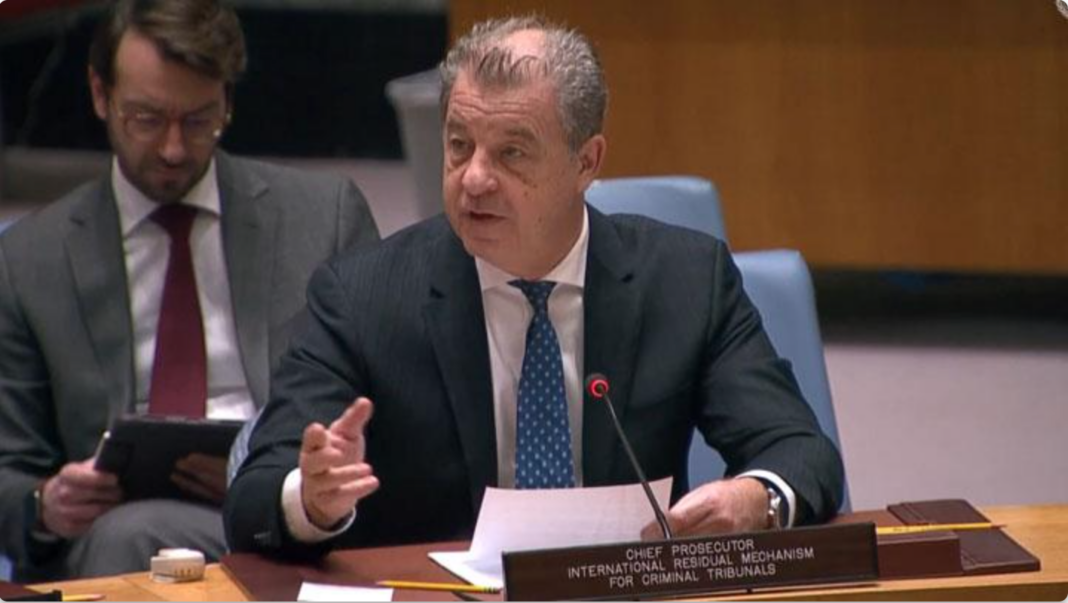Arusha, The Hague, 12 June 2023 – Serge Brammertz, Prosecutor of the International Residual Mechanism for Criminal Tribunals (Mechanism), today addressed the United Nations Security Council about the work of the Office of the Prosecutor (OTP).
Prosecutor Brammertz focused his remarks on recent developments following the submission of his written report on 15 May 2023.
He began by briefing the Security Council on the successful arrest of Rwandan fugitive Fulgence Kayishema on 23 May in Paarl, South Africa. The Prosecutor stated, “Kayishema’s arrest is a signal moment in the global effort to punish perpetrators of genocide.”
He noted that an arrest of a fugitive “renews faith in international justice,” as for the victims and survivors of Kayishema’s crimes, “[t]he wrongs they suffered thirty years ago can begin to now be put right.” In addition, this arrest demonstrated again the international community’s “determination to ensure that genocide is repressed and punished.”
Prosecutor Brammertz further highlighted the critical role played by United Nations Member States in the investigation and arrest. He informed the Security Council that the OTP “enjoyed the full and unreserved support of South African authorities, who established an operational task force to assist our investigations.” He also commended the support provided by Eswatini, whose authorities demonstrated exceptional dedication and cooperation, as well as Mozambique, whose Attorney General offered the full support of her office. He noted that as always, Rwandan authorities “made enormous contributions to our success.”
On behalf of the OTP, Prosecutor Brammertz extended “our deepest gratitude to these countries and others who cooperated with our investigation. The challenges were immense, and it was only by working so closely together that Kayishema was finally located and arrested.”
Prosecutor Brammertz then updated the Security Council on the recent appeal judgement in the final ICTY case, Stanišić and Simatović. He noted that the Appeals Chamber accepted the OTP’s arguments and found that both accused were criminally responsible as members of a joint criminal enterprise for a larger number of crimes in Bosnia and Herzegovina. Stanišić and Simatović shared the intention with other Serbian, Croatian Serb and Bosnian Serb leaders to ethnically cleanse non-Serbs from large areas of Croatia and Bosnia and Herzegovina. They further contributed to the implementation of the joint criminal enterprise in important ways, particularly by supporting notorious paramilitary groups.
Reflecting on this result, Prosecutor Brammertz stated, “This judgement is a fitting final chapter in the work of the ICTY. Over thirty years of work, we were able to successfully prosecute senior political, military and police officials from all sides of the conflicts. We demonstrated that accountability for the most serious international crimes is possible, while also leaving as our legacy a record of what occurred.”
Prosecutor Brammertz also noted the recent decision in the Kabuga case. While explaining that the decision is not yet final and will likely be appealed, he stated, “What I can say at this point is that my Office believes the trial against Kabuga can and should be completed in a manner that is consistent with the rights of the accused.”
Looking forward, Prosecutor Brammertz informed the Security Council that “the Mechanism is actively planning its future as a true residual institution.” In this regard, he explained that for the OTP, in the coming years “our focus will in particular be on our mandate under Article 28(3) to assist national jurisdictions to continue the accountability process for international crimes committed in Rwanda and the former Yugoslavia.” He noted that “there can be no question that much more justice still needs to be achieved at the national level”, highlighting that in Rwanda, “there are more than 1,000 fugitives to be prosecuted”, while in the former Yugoslavia, “national prosecutors still must deal with several thousand cases.” The OTP, he said, “plays a critical role in supporting this continued accountability process”, by which “Member States themselves take the lead in securing further justice and promoting peace.”
In conclusion, Prosecutor Brammertz reminded the Security Council that genocide denial and the glorification of war criminals remain significant concerns. He said, “The international community is determined to bring war criminals to trial. It should be equally committed to promoting the truth after those trials are completed.”



